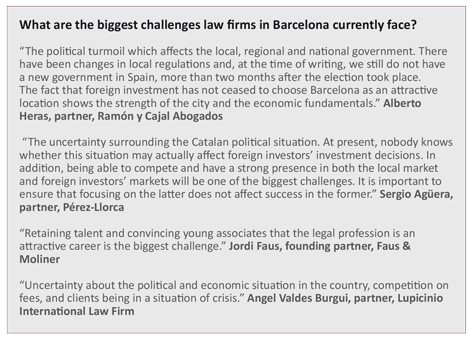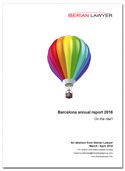Barcelona report 2016: On the rise?
Transactional activity was unexpectedly high in Barcelona over the last year, but wider macroeconomic concerns mean there are doubts as to whether lawyers’ workflow will remain at a similar level over the next 12 months
The level of activity experienced by Barcelona law firms in 2015 was pleasantly surprising for many lawyers, with a number of firms reporting that revenue exceeded expectations in the last 12 months. The key driver was an increase in M&A, though this included a significant amount of “distressed” transactions. However, the big question is will the flow of deals be maintained in the coming year? Opinion is divided, for some firms insolvency work has largely dried up, while others express concerns about the possible impact of the decline in capital markets activity – as well as China’s economic slowdown – on the Barcelona market. But there is more optimism in other quarters – some lawyers are encouraged by the fact that there is a significant amount of liquidity in the market and this, coupled with low interest rates, means that many Catalan companies will be looking to expand in the coming year, they argue.
Allen & Overy partner Antoni Valverde says there has been a significant amount of M&A work in the Barcelona market in the last 12 months. He adds: “Inbound work has gone up and there has also been some substantial finance and restructuring work.” This view is echoed by Cuatrecasas, Gonçalves Pereira partner Víctor Xercavins, who says: “2015 was a very good year in the M&A market – 2016 will probably be a good year as well, but it is yet to be seen whether it will be as good as last year, though we do have a busy pipeline of deals.” 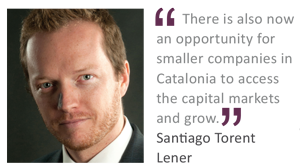 Insolvency work in the Barcelona market “almost disappeared” in the last year, according to Jausas partner Agustín Bou. He adds: “This year will be the year of compliance.” Meanwhile, other lawyers anticipate less activity in 2016 due to China’s economic slowdown and the slump in worldwide capital markets. Marimón Abogados partner José María Lamarca says political uncertainty is affecting investment and this means there has been a reduction in corporate and M&A activity in Barcelona.
Insolvency work in the Barcelona market “almost disappeared” in the last year, according to Jausas partner Agustín Bou. He adds: “This year will be the year of compliance.” Meanwhile, other lawyers anticipate less activity in 2016 due to China’s economic slowdown and the slump in worldwide capital markets. Marimón Abogados partner José María Lamarca says political uncertainty is affecting investment and this means there has been a reduction in corporate and M&A activity in Barcelona.
More liquidity
The fact there is considerable liquidity in the market means that international investors are doing deals in Spain, according to Santiago Torent, partner at Lener. “There is easy access to finance and the interest rates are low,” he adds. “There is also now an opportunity for smaller companies in Catalonia to access the capital markets and grow and this is an opportunity for law firms to render our services.” Torent adds that there is still a considerable amount of restructuring and “distressed M&A” work available.
Roca Junyent managing partner Joan Roca says it has been a “hectic year”. He adds: “I’m optimistic – investors are looking at Spain as a place of opportunities, M&A is increasing and insolvencies have declined, though it’s a volatile market.” There is significant activity in the real estate sector, Jordi López, partner at Pintó Ruiz & Del Valle, says. He continues: “There is a lot of interest, and foreign funds – especially those linked to China and the Middle East – see the whole of Spain as an opportunity for speculative investment.” RCD – Rousaud Costas Duran partner Ignasi Costas says 2015 was a good year in terms of revenue. “The last 12 months have been active in terms of mid-market and real estate deals – 2016 will be a good year, at least as good as 2015,” he adds.
 Tough year ahead
Tough year ahead
Antonio Herrera, partner at Uría Menéndez, says the slowdown in the Chinese economy, the decrease in capital markets activity, in addition to political instability in Catalonia means that the next 12 months will be a tough year. He continues: “2015 was better than expected, but there has been a decline in activity.” Lamarca agrees that the coming year could be challenging from an economic perspective: “The legal market is changing and our concern is to move our firm in the right direction – it’s impossible to make predictions.” Baker & McKenzie partner Jorge Adell believes there has been an “evolution in the financing of transactional projects in recent months”. He adds that it is becoming more difficult to obtain finance from Spanish banks. “This has triggered the greater presence of debt funds, which are prepared to assume a higher risk and request less covenants in the finance agreements, but they are not cheap.”
Efficiency is one of the biggest challenges currently facing law firms, argues Adell. “Specifically, how to make the firm more efficient in order to optimise profit, given the high level of competition in the market.” He continues: “Project management is a way to increase efficiency, but this is a challenge for lawyers. Another strategy, adopted by a number of firms, is to open offices that do certain types of work in places where work can be sold at a cheaper price, and therefore competitiveness is increased. Initially, these places used to provide administrative, word processing or translation services, for instance. Now they also do paralegal or legal work.” Torent says clients are now more informed and have strong opinions about how legal services should be rendered. He adds: “Law firms need to be more aware of risk management and clients demand that transactions are closed more swiftly – we need to review our profession constantly.”
Torent says clients are now more informed and have strong opinions about how legal services should be rendered. He adds: “Law firms need to be more aware of risk management and clients demand that transactions are closed more swiftly – we need to review our profession constantly.”
The attitude of lawyers is changing, according to Herrera. He adds that there is a risk that students studying law and economics, for example, may be more tempted to join a consultancy upon graduation, rather than a law firm, which is a “two-year project”. Torent argues that being a lawyer “will always have its appeal”. He continues: “I’m much more worried about senior associates because now we require professionals to be highly skilled, but also good project, account and team managers. They also need to have a global perspective of what they’re doing. Trying to find people like that is difficult.”
Xercavins says it is difficult to predict the resources law firms will need in future. “Young lawyers tend to have strong feelings about the field of law they want to practice and say, for example, I want to do capital markets – it’s an issue when it comes to managing law firms,” he says. “It used to be that being a bright lawyer was enough, but nowadays good lawyers also need to have some commercial sense/ management skills and to get those is not an easy task.”
People management in law firms is always challenging, according to Valverde. “This business ultimately revolves around how many hours you put in, how many people you put into the relevant job and how much you charge for each hour on that job, but keeping pace with market developments and being able to attract top talent are both key,” he says.
In terms of fees, all law firms “felt the pressure on fees during the crisis”, according to Xercavins. But he adds: “Fees are currently recovering”. López says clients are increasingly “demanding in certain cases alternatives to budgets only based on hourly rates, such as fixed rates and success fees, and sometimes capped fees”. Xercavins believes project management and knowledge management will become more critical in future.
Torent says the biggest challenge for law firms in the Barcelona market is that there are “lots of small companies that are starting to deal internationally and are now looking to attract investment”. He adds: “Such companies usually work with lawyers who have little knowledge of transactions, and they seek more highly skilled firms; the challenge for medium-sized highly- skilled law firms is to identify this window of opportunity.” Roca says another challenge facing law firms is that clients have a much better idea than lawyers what the benchmark is with regard to fees.
Need for reinvention 
Meanwhile, Roca says the main focus of many law firms frequently changes. He continues: “How many lawyers within our law firms have changed from M&A to insolvency and are now going back? The challenge for young lawyers and mid-level lawyers is that they will not do what they have done forever. They will change and this is new. Lawyers have to be ready to reinvent themselves. This is something the legal profession is not telling young lawyers, but it should be.” However, Bou says that moving lawyers from one area of practice to another is not easy: “It’s better to take them out and pick up someone else who has the expertise because the client is not going to wait until your people are well-trained.” Costas says it can be difficult for a lawyer to change their area of practice. “It’s not easy to shift from creating companies and doing IPOs to killing them, it’s not easy from the mindset of a lawyer,” he adds.
Herrera says that law firms need to compete on more than simply price. “It cannot only be about fees,” he says. “Becoming competitive in terms of fees is easy, you only have to be cheaper, it’s about how to create value, and also project management.” Bou says that some clients give their legal advisers draft contracts with the aim of trying to save on the cost of their lawyer drawing up a contract.
An important issue for law firms is how to deal with the commoditisation of certain work, according to Xercavins. He adds that in future it will be critical to “provide added value to the client”. Regarding the issue of fixed fees, another partner says one approach law firms take is to include details of fees at the outset but then say “provided this is a standard transaction”.
Lamarca says the Anglo-Saxon law firm model “seems to be succeeding” in Spain. He adds: “This obligates Spanish firms to reflect on the law firm model clients will require in the future; 2016 will be a challenging year, we are prepared to do our best, but we will need to be very focused and very smart.” Valverde adds that innovation – including technology-based solutions for compliance – is a big challenge for all law firms.
Bou is optimistic about the prospects for the coming year. “It’s easy to grow again,” he says. “There are also new trends for building relationships and communicating with clients, including technology like LinkedIn and Twitter.” CMS Albiñana & Suárez de Lezo partner Juan Pablo Correa is also optimistic about the outlook for 2016. But he adds: “It is important for lawyers to reinvent ourselves and we also have to reinvent our profession.”
The signs are good for 2016, according to Adell. “There has been an increase in the number of billable hours and the pipeline of work is okay,” he says. “But efficiency and competiveness continue to be a challenge – knowledge management and project management in law firms have to improve. The ability to move lawyers between offices in order to meet client demand is also a key tool, particularly for international work.” Valverde says: “I hope 2016 is going to be a decent year but I am afraid it won´t be as decent as 2015 – conditions are volatile so innovation and efficiency are becoming more important.”
The year 2015 was good and was not as bad as had been predicted, says Roca. “World events are the challenge – Russia, Brazil after the Olympics, Europe after the Brexit referendum,” he adds: “Our industry has become worldwide – small Barcelona businesses have exported, previously they may have had 10 per cent of their business abroad, but now it could be 60 per cent, or 80 per cent, this is the threat and the challenge. Investors see Barcelona as a good place to invest.”
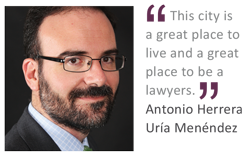 Moral obligation
Moral obligation
Costas expects 2016 to be a good year, but he adds that clients will continue to put pressure on fees. “We all have the moral obligation of keeping people happy in terms of what they expect from the law firm,” he says. “Things are uncertain and that will affect the profession – we have to reconsider the role of the profession in society, we are not perceived in the way we should be; maybe we have not properly communicated our value to society.”
Herrera says he is cautious about the coming year. “We must ensure we retain the best talent and convince people from different places to come here,” he says. “This city is a great place to live and a great place to be a lawyer. Barcelona has great universities and is more of a financial centre since the crisis, while Catlan companies are more international and exporting more. The world will become less about jurisdictions and more about cities. However, from a political perspective, we don´t know what is going to happen.”
The outlook for 2016 is promising, according to López, though he adds he doesn’t expect it to be as good as 2015. “We have to be cautious and prudent, we’re just leaving crisis, the political situation is not stable, law firms should not start very ambitious growth,” he says. “There should also be measures to minimise risks – moving lawyers into different practice areas is probably more prudent than hiring a lot of new lawyers.” 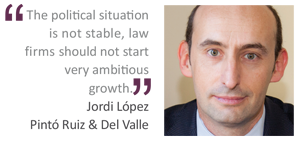
Torent says the future is bright in terms of opportunities for legal work. “We will have two more years of distressed transactions and restructuring, and we will also see more M&A as there is access to capital,” he adds. Torent says that law firms should be more transparent with their junior lawyers. He continues: “The lawyers of the future will have to be more flexible, with a better global perspective, so it’s good to tell them this – lawyers should be more willing to study a wider range of disciplines. Lawyers need to be good client, project and knowledge managers.”
Barcelona law firms with lawyers that are flexible – in terms of being willing and able to switch between different practice areas – and who are commercially minded should flourish in the coming year. The prospect of many of the city’s smaller companies entering acquisition mode means that there should be a considerable amount of deals activity in the next 12 months. However, the lawyers that make the most of these opportunities will be those that have other skills in addition to being a good technical lawyer – in a rapidly changing market, client management, project management and knowledge management abilities are what will set the outstanding lawyers apart from their competitors.
